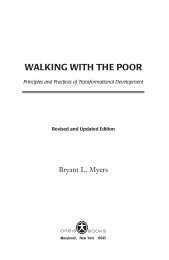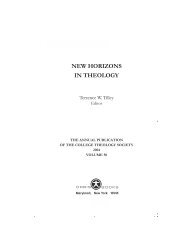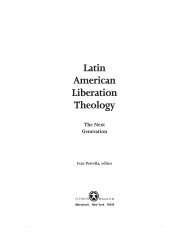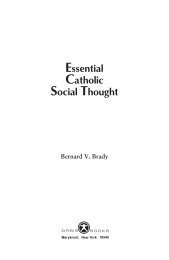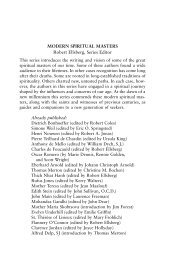CONCEPTS OF MISSION - Orbis Books
CONCEPTS OF MISSION - Orbis Books
CONCEPTS OF MISSION - Orbis Books
Create successful ePaper yourself
Turn your PDF publications into a flip-book with our unique Google optimized e-Paper software.
Mission in Contemporary Missiology 25<br />
Thus, Vatican II confirms that the event of Christ is the event that gives<br />
meaning and fulfillment to this world and to history. This meaning continues<br />
to receive its progressive and successive fulfillment through the mission of the<br />
church. Sacred and profane history are touched; cosmic time and sacred are<br />
implied in turn. The risen Christ, an example of the power of God which<br />
transforms nature, becomes the sacrament of this transformation. Another<br />
example of the divine transforming power is the Eucharist, where the created<br />
things, cultivated by human hands, are transformed (GS 38; Forte 1975).<br />
Indeed, eschatology is explained best in terms of recapitulation of all in<br />
Christ (CCC 831-32).<br />
Mission and Dialogue with Contextual Theologies<br />
One of the emergent realities in mission studies is the increasing interest in the<br />
theologies of the Third World. It may not be wrong to say that the new ways<br />
of mission came about, largely, as a result of the realities of the Third World<br />
and the emergent theological reflections there. Thus, in this twenty-first century,<br />
contextual theologies may assume a new dimension in mission studies.<br />
One of the critical issues facing Christian mission has always been to respect<br />
and preserve the cultural identity of the people being evangelized and to help<br />
them find and recover all their cultural and religious heritage in Christ. Christian<br />
mission is about the encounter of the gospel message of Jesus Christ with<br />
different peoples and their ever-newer religious-cultural and sociopolitical<br />
contexts. It is about the impregnation of these contexts by the gospel, the<br />
assimilation of people’s cultures by the gospel and that of the gospel by cultures,<br />
and the history of the consequent changes in the process of evangelization<br />
and of people’s cultures.<br />
Again, if mission theology until now has been dominated by the works of<br />
theologians from the North Atlantic, recent studies are showing that the<br />
future of mission and indeed of Christian theology will be determined by<br />
emerging contributions from Third World theologians. Theology, as is often<br />
said, is born of mission and of the concrete situation in which the evangelizing<br />
church finds itself. Even North Atlantic theology has started to become<br />
conscious of its contextualized nature despite its traditional claim to universalism.<br />
And Third World theologians are also becoming increasingly aware<br />
that the sociocultural, religious, economic, and political realities that make<br />
up the respective contexts of their theologies are inseparably linked with this<br />
claim of North Atlantic theology to universalism. Thus, as is already evident,<br />
North Atlantic and Third World theologians are now engaged in a fruitful<br />
and mutually critical dialogue. This dialogue, or rather the renewed interest<br />
for a new vision of relationship between the churches of the North Atlantic<br />
and those of the global South, is inspired by the same reality (Jenkins 2002).<br />
Rather than talk of “displacement” of the North by the South, it is better to




